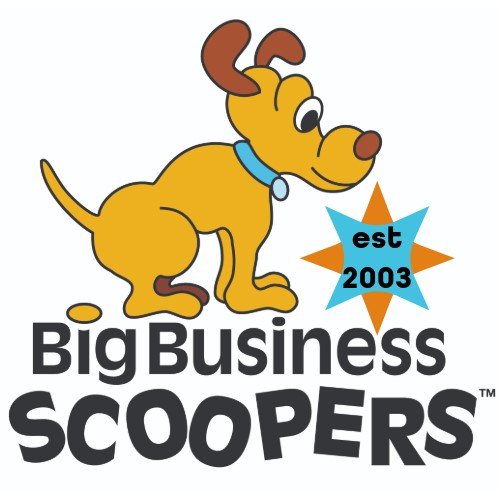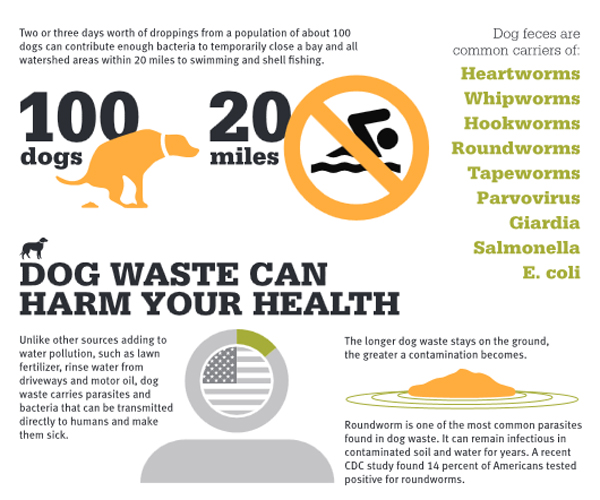A single dog poop can contain millions of germs, parasites and bacteria that are harmful to human and dog health alike. The Environmental Protection Agency places dog waste in the same category as herbicides, insecticides, oil, grease and other toxic chemicals. And with the number of dogs living in America on the rise, with 89.7 million recorded in 2017, the amount of this toxic waste in our environment is also on the rise. Dog poop that is left on the ground can be carried up in stormwater and make its way into our untreated waterways. This poses a great risk to organisms that depend on those ecosystems as well as people who use them for recreational purposes. In order to protect New Jersey's five water regions and has twenty watershed management areas (WMAs), and our environment as a whole, we must be more conscious about how we handle and dispose of our dogs' waste.
The first thing you can do to help minimize the negative impacts of dog waste on our environment is simply to make sure that it is picked up on a regular basis. Ideally, dog waste should be picked up as soon as it hits the ground and this is especially true when you are walking your dog in your community. But every practical dog owner knows that this just isn't feasible when it comes to dogs using a private outdoor space like a yard or dog run on a regular basis. In this situation the best frequency of pickup really depends on the size of the space, number of dogs and humans using it and its proximity to waterways. But the safest bet, as a general rule, is to pick up collected dog waste once every week. This is what we recommend for most of our clients.
When we go to a yard for a cleaning we use 13 gallon trash bags to line a bin into which we deposit each pile of poop that we find using a hoe-like periscopic tool. At an average stop we collect one bag and then place that bag into a second bag before placing it into the trash or hauling it away (either way, its destination is the landfill.) During first time cleanups, like the one pictured below, and at yards that are used by three or more dogs it is more common to use 2 or more bags. With an average of 25-30 stops per route, collecting at least 2 bags per stop, Big Business Scoopers alone uses 50-60 plastic trash bags per route. Our Scoopers manage 17 routes per week over several New Jersey counties, bringing this total to at least 850 plastic bags used per week. Of course, plastic is currently the optimal way to contain this toxic waste quickly and effectively, in order to prevent the spread of illness, but we do understand the implications of our business using so much of it. Sometimes, it feels like we are canceling out the good we do of removing dog waste by also depositing so much plastic into our environment. Talk about a conundrum!
We pride ourselves on helping create a world in which dogs (and their humans) can live together even more harmoniously by enjoying safer and healthier outdoor spaces. Thinking responsibly about how we are impacting our communities and environments by how we handle dog poop pick up and removal is an integral part of constantly striving toward that goal. And to that end, we are, in this 15th year of business, beginning to look into options for disposing of dog waste in a more sustainable and eco-friendly way. It will likely be a many years journey of discovery along which we are sure to make mistakes and learn some stinky lessons. But we feel that it is imperative that we always attempt to do our small part.
The options are many and varied for offering our customers greener options. We can swap 13 gallon plastic bags for ASTM 6400 certified large compostable bags like those offered by EcoSafe or BioBag, which will break down after reaching the landfill thus reducing plastics waste. There is a product called Doggie Drain that seamlessly hooks up to a building's outdoor sewer line, allowing our Scoopers to flush (with a hose) dog waste directly into the sewer system. Some trail blazers in the pet waste removal industry, like Green Scoop in Ohio, are partnering with local water treatment plants or companies that have the capability to convert dog poop into natural gas and electricity. Then there are DIY dog poop composter products like the Doggie Doolie which could be good options for dog owners with a lot of property and an open mind about composting right at home! And there are certainly others that we have not yet come across. We hope to share what we learn here on the blog as well as on social media so please feel free to follow along on this journey and share your thoughts and comments.
Here's to greener dog poop!




